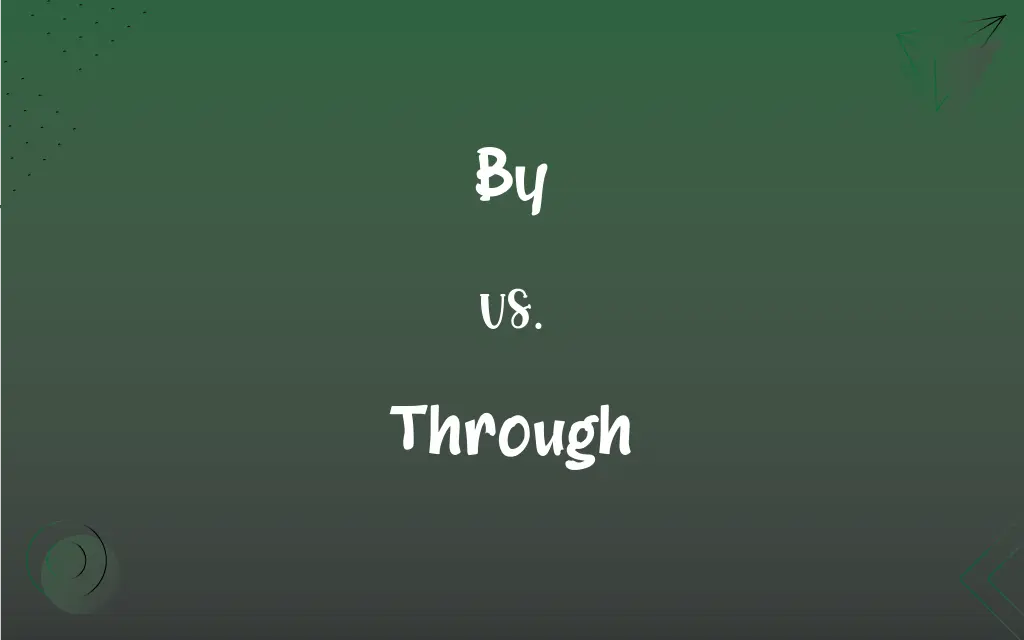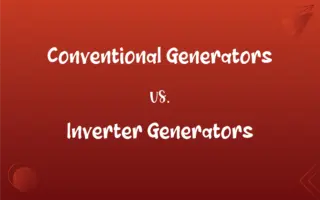By vs. Through: What's the Difference?
Edited by Janet White || By Harlon Moss || Updated on October 6, 2023
"By" often indicates the means or agent of an action, while "through" typically denotes movement within or completion of an action.

Key Differences
When used as a preposition, "by" can indicate the agent or means of an action. For instance, "The painting was done by an artist" shows who performed the action. On the other hand, "through" can signify movement from one end or side to another, like "He walked through the door."
In another sense, "by" can be used to indicate proximity, as in "The school is by the park." Contrastingly, "through" can describe the medium or channel of communication or means, as illustrated by "I sent the message through an email."
"By" can also be employed to indicate the extent or amount of difference, such as "She won by five points." In a different vein, "through" can suggest a process or series, like "He read the entire series through the summer."
The word "by" might denote a deadline or specific time, illustrated in the sentence "The task should be completed by 5 PM." Meanwhile, "through" can express a time duration, as seen in "The store is open Monday through Friday."
Another distinction arises when "by" is used to highlight a method or means, for example, "She traveled by train." Conversely, "through" might highlight the idea of thoroughness or completion, showcased by "He went through all the documents."
ADVERTISEMENT
Comparison Chart
Basic Function
Indicates means or agent of action.
Denotes movement within or completion.
Proximity or Method
"Near" or "next to"; or a method of doing something.
Movement from one side to another; or via a medium.
Extent or Difference
Amount of difference or specific time.
Refers to a series or duration.
Deadline
Specific time for completion.
Period or duration.
Thoroughness
Method or means.
Comprehensive action or complete movement.
ADVERTISEMENT
By and Through Definitions
By
Used to show the method or means.
They traveled by bus.
Through
Denoting movement from one side to another.
She walked through the door.
By
Indicating the agent performing an action.
The song was written by Paul McCartney.
Through
Indicating a medium or channel.
He heard about it through the radio.
By
Referring to proximity or location.
The bakery is by the park.
Through
Referring to a series or sequence.
She read through all the chapters.
By
To show the extent or amount of difference.
She is older by two years.
Through
Referring to a duration or period.
The shop is open Monday through Friday.
By
Denoting a deadline or specific time.
I'll have that done by tomorrow.
Through
Highlighting thoroughness or completion.
He looked through every file.
By
Close to; next to
The window by the door.
Through
In one side and out the opposite or another side of
Went through the tunnel.
By
With the use or help of; through
We came by the back road.
Through
Among or between; in the midst of
A walk through the flowers.
By
Up to and beyond; past
We drove by the house.
Through
By way of
Climbed in through the window.
FAQs
Can "through" imply thoroughness?
Yes, like in the phrase "read through the entire book."
Is "by" used to show proximity?
Yes, "by" can denote proximity or location, as in "house by the lake."
When talking about weekdays, how would I use "through"?
You could say "Monday through Friday" to indicate the entire workweek.
How do "by" and "through" differ in expressing methods?
"By" often highlights the method or means ("by car"), while "through" can stress the medium or channel ("through email").
Can "through" suggest completion?
Yes, it can, like "He went through the entire list."
Can "by" denote a deadline?
Yes, "by" can indicate a specific time or deadline, like "by 5 PM."
How do "by" and "through" differ in terms of time?
"By" often points to a deadline or specific time, whereas "through" can express a duration or period.
In which contexts is "through" most commonly used?
"Through" is often used to indicate movement, medium, duration, thoroughness, or sequence.
How does "through" relate to medium or channel?
"Through" can indicate the means or channel by which something is communicated or achieved, such as "I sent it through email."
Can "by" refer to an agent performing an action?
Yes, "by" can indicate who performed the action, as in "painted by the artist."
Can "through" mean from start to finish?
Yes, it can signify the entirety of a process or period.
How would I use "by" to indicate difference?
You might say "He is taller by three inches."
Can "through" express a sequence?
Yes, like in "She went through all the steps."
Would "by" be used to denote agency in passive sentences?
Yes, in passive constructions, "by" can indicate the agent, as in "The book was written by the author."
Can "by" be used with measurements?
Yes, as in "The room is 10 feet by 12 feet."
Does "through" indicate movement?
Yes, "through" often denotes movement from one end or side to another.
Does "through" ever refer to a medium of communication?
Yes, it can, as in "I heard it through the radio."
Does "by" always indicate an agent?
Not always. While "by" can show an agent, it has other uses, like denoting method, proximity, or deadline.
Can "by" and "through" sometimes be used interchangeably?
In some contexts, they might be used similarly, but they often have distinct nuances.
Can "by" show a method of travel?
Absolutely, such as in the phrase "travel by train."
About Author
Written by
Harlon MossHarlon is a seasoned quality moderator and accomplished content writer for Difference Wiki. An alumnus of the prestigious University of California, he earned his degree in Computer Science. Leveraging his academic background, Harlon brings a meticulous and informed perspective to his work, ensuring content accuracy and excellence.
Edited by
Janet WhiteJanet White has been an esteemed writer and blogger for Difference Wiki. Holding a Master's degree in Science and Medical Journalism from the prestigious Boston University, she has consistently demonstrated her expertise and passion for her field. When she's not immersed in her work, Janet relishes her time exercising, delving into a good book, and cherishing moments with friends and family.































































